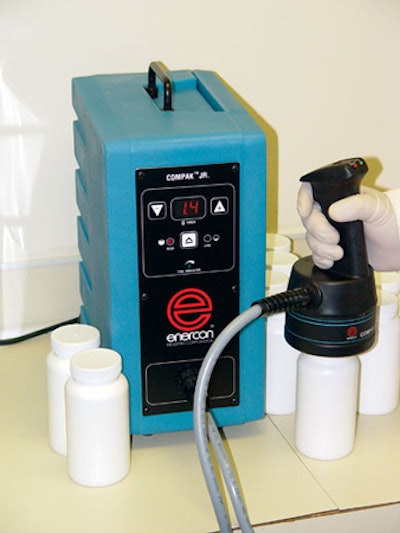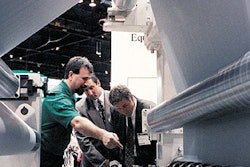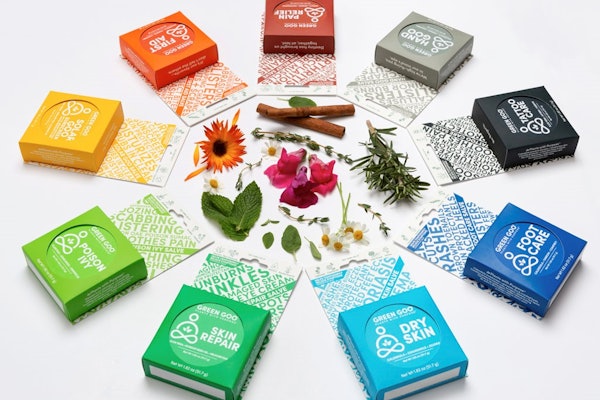Talk with Dr. Harold Harder and you realize he’s a man on a mission. As president of Blessings International, he’s actually a man on a multitude of international missions. Tulsa, OK-based Blessings is a 501(c)(3) nonprofit organization that provides pharmaceuticals, vitamins, and medical supplies to teams or missions that supply the drugs to clinics and hospitals in developing nations that serve indigent populations. Blessings is also involved in its own benevolent projects that provide pharmaceuticals to locations of special need and/or disaster relief, as well as delivering medicines used by other organizations for their missions.
Blessings’ work was made much easier late last year when it added an Enercon Compak™ Jr. portable induction cap sealer, a Modular Packaging Systems’ MC-2 tablet counter-filler, and a Model R310 semi-automatic labeler from Universal Labeling Systems.
“In any one year, we supply between 70 and 90 countries worldwide with products,” says Harder, who earned a Ph.D in biophysics and a fellowship in pharmacology. “In our 25 years, we’ve shipped to more than 140 countries. Our products are all shipped outside the United States.”
Harder explains that about 95% of these products are solid-dose tablets or capsules, though Blessings does provide some powdered oral suspensions, as well as a limited amount of medical devices, such as stethoscopes, blood pressure cuffs, and surgical scalpel blades. “The majority of the products are generic antibiotics for common ailments,” he notes, “such as upper and lower respiratory infections, skin and urinary tract infections.”
Addressing efficiency
Blessings sources drugs globally, including the purchase of pharmaceuticals in the U.S. Most of the drugs purchased internationally are bought in bulk for economic reasons. Harder estimates that Blessings repackages nearly one-third of its drugs and vitamins. These are filled primarily into bottles at its 5ꯠ-sq’ facility, which the company plans to expand. The organization also outsources some of its packaging. Harder says, “We’ve really gotten more seriously into repackaging in the past year.
“There are only six of us at Blessings,” he notes. “There’s a cost in getting product here, a cost to lease our facility, to pay utilities, and to pay the staff. Blessings markets both purchased and donated pharmaceuticals. Due to the large quantity of a limited number of donated medicines [usually with a short shelf life], we give a large fraction of these donated products to our own projects and to other Christian organizations with which we network that can quickly move the product overseas. To cover our costs of operations, we assess a charge to medical teams requesting medicines. Typically, short-term medical teams select purchased product [with a longer shelf life] for which there is a market.
Pack Expo proves a blessing
To meet its growing repackaging demands, Blessings sought to go from manual packaging to at least a semi-automatic mode. One trip to Pack Expo 2004 in Chicago did the trick.
Harder recalls, “The PMMI (Packaging Machinery Manufacturers Institute) people gave me some suggestions that really hit the nail on the head. I found my time at Pack Expo was very valuable and I really appreciate that the companies at Pack Expo were willing to pass me along to another manufacturer if they didn’t have exactly what I needed. That takes a lot of maturity, and speaks well of the industry.”
Harder’s search at Pack Expo led to Enercon, Universal, and Modular. “These are all new machines,” he says. “After the show I received approval from our board of directors and we started buying the equipment.” The equipment was up and running late last year.
Automated processes
The Modular tablet counter and filler allows Blessings’ personnel to open bulk packages of tablets and pour them into a funnel or hopper. The machine counts and fills bottles. “It replaces the backbreaking work of manually pouring tablets in a funnel over the bottle set onto an electronic balance, which we only do now for really small runs,” says Harder.
Filled bottles are manually capped before they’re induction-sealed on the Enercon Compak Jr. “Before, we just used a pressure seal liner in a cap so when we hand-sealed it to the bottle, the pressure from screwing the cap tight would cause the glue on the liner to seal to the mouth of the bottle.” Unlike hand sealing, the new process provides tamper evidence. That helps Blessings meet Good Manufacturing Practices and ship packages with a more professional appearance, which in turn creates a favorable impression of Blessings Intl.
The Compak Jr. is used on bottle sizes from 60 to 750 cc. The unit’s timer is set to the number of seconds the inner seal requires for a secure bond. To seal the cap liner to the mouth of the bottle, the Blessings worker puts the Compak Jr.’s sealing head on the cap and presses a trigger on the handle of the machine. The timer counts down to 0 as power is applied. Torque, power, and time may be adjusted to assure that seals are secure and consistent.
Harder says that Blessings relies on a variety of bottle and closure vendors, with price typically the key factor in the decision-making process. Berlin Packaging and Container Supply are two primary suppliers of both bottles and closures. Bottles are typically white or opaque, molded of high-density polyethylene.
Blessings uses wraparound pressure-sensitive labels on most of its bottles.
Until it added the Universal labeler, Blessings’ employees and volunteers applied labels manually. The process was labor-intensive and resulted in inconsistent label placement. The automatic labeler consistently places labels, which helps justify the equipment investment.
“We want to have a reputation of quality,” says Harder. “We’ve had people in Iraq and other places tell us how professional the labeled bottles look. Given that we have limited space, and the fact that it is not easy to manually put pressure-sensitive labels on a round bottle straight, the net result is a much more professional-looking product.” He adds, “We’re now able to put an expiration date and lot number on preprinted pharmaceutical labels using the hot-stamp imprinter on the labeler. Previously, we had no way of printing those except one at a time on an electric typewriter.
The bottom line
“We’ve seen an immediate value in the new packaging equipment. It reduces time for bottling and labeling by about 75 percent, so there are labor savings,” Harder notes, “even though we do have volunteers to help with labeling. The volunteers free up our full-time staff to do other tasks that are more appropriate for their skills.” Volunteers do not work with filling operations.
Looking strictly at the “bottom line,” Harder says, “The cost of the equipment purchases so far is about $20ꯠ. To put it into perspective, that amount is small relative to [overall business] software investments and obligatory upgrades that come along. A new piece of equipment may last us 10 years, which means the amortized cost comes to $2ꯠ a year [for the three machines].”
Harder explains that there is another aspect to the equipment justification. “When drugs are imported there is a long lag time between order and arrival at our warehouse. While waiting, package inserts, outserts, and labels must be written and printed. So there is a real time crunch when a container arrives to quickly bottle the medicines.” Most inserts are placed into bottles, while outserts typically are placed in the shipping case. Bottles are not packed into individual folding cartons.
Harder explains that Blessings International pays close attention to shelf life dates. The main concern is the time it takes before the packaged products arrive at Blessings. Most of the products carried by people for mission projects, he says, are used within about a month.
With the automated equipment, he says, “The time saved in getting the job done, at least to catch up with requests, is invaluable. Thus, the justification for obtaining the packaging equipment is not just long-term economics, it also relates to the timeliness of preparing these medicines for shipment.” And for an organization on an international mission, those benefits become blessings.




















